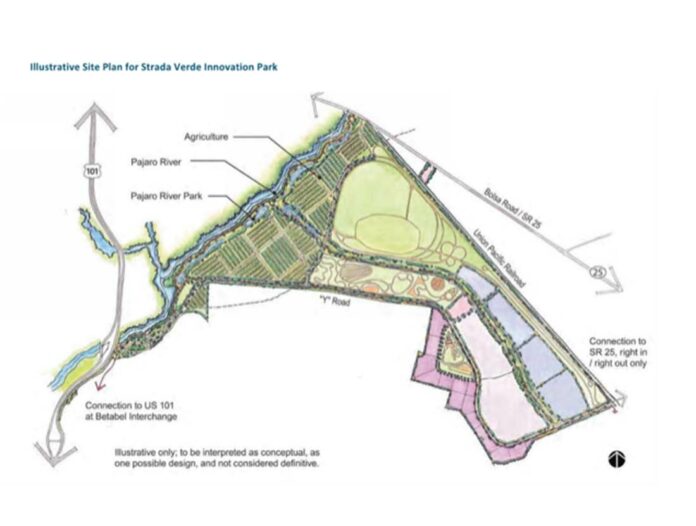
A major development proposed for northern San Benito County could soon qualify for the November ballot after proponents gathered signatures in what they are calling “record time.”
Opponents, however, say the initiative process allows the developer to supersede environmental review.
The Strada Verde Innovation Park Voter Initiative was filed with the San Benito County Registrar of Voters in late May. According to the campaign committee in support of the project, San Benito County Residents for Job Creation, 3,205 signatures were collected over 10 days. In San Benito County, 2,060 valid signatures from registered voters are required to qualify the initiative on the November ballot.
The county elections department confirmed that the signatures were submitted on June 29. Elections officials have 30 days to verify the signatures.
The 2,777-acre project, which would be accessed from the Betabel Road interchange on Highway 101, is located between highways 25 and 101, bordered by the Pajaro River to the northwest. It is near the Santa Clara County border line, roughly seven miles south of Gilroy.
Early proposals call for automotive testing facilities, including a three-mile straightaway and high-speed tracks, which are in “high demand by automakers and emerging technology companies,” the proposal by Newport Beach-based developer Newport Pacific Land Company states.
An e-commerce center including up to 5.8 million square feet is also envisioned.
The project proposes 562 acres for agriculture, as well as a 209-acre park adjacent to a three-mile stretch of the Pajaro River, where a multi-use trail and wildlife observation areas for the public would be built.
Proponents estimate the project would bring more than 18,000 construction jobs, and once fully built out over a number of years, would provide 5,500 permanent jobs.
Scott Fuller, a member of the campaign, said the initiative, should it qualify for the ballot and pass in November, would establish a Specific Plan for the property, as well as General Plan and zoning designations.
In a press release, Bob Tiffany, president of the San Benito County Business Council, said he believed that the response to SVIP has been positive due to the economic downturn caused by Covid-19.
“Our economy has started to slide into a recession and thousands of our neighbors have lost their jobs,” he said. “I think voters recognize that now—more than ever—we need a project like SVIP that brings unprecedented job growth and economic opportunity to San Benito County.”
The campaign committee, sponsored by Newport Pacific Land Company/Bristol SB, cites its major funders as Washington-based Pacific Rim Real Estate Group, Rockne Construction of Newport Beach and PRP Land.
Preserve Our Rural Communities, a citizens group that has been at odds with San Benito County over land use designations, commissioned its attorney Mark R. Wolfe to analyze the voter initiative process for Strada Verde.
In his analysis, Wolfe cited the 2014 California Supreme Court case, Tuolumne Jobs & Small Business Alliance v. Superior Court. That case, which addressed a Walmart expansion project in Sonora, found that valid voter-driven initiatives are exempt from full review under the California Environmental Quality Act, whether they are put to election or adopted by a government body.
Election code requires governing bodies to adopt the initiative or order a special election within 10 days of the signatures being verified, the ruling stated.
CEQA review, meanwhile, “typically takes months.”
“Considering the time necessary for agencies to review the potential environmental impacts of a project and allow public review and comment, it would be impossible for a city to complete CEQA review within 10 days before adopting a voter initiative,” the ruling stated.
A report by Catherine Engberg of Shute, Mihaly & Weinberger and Carlsbad City Attorney Celia Brewer echoed Wolfe’s analysis.
“Since [the 2014] decision, California cities and counties have seen a sharp increase in development projects being proposed by the ballot,” they wrote. “These ‘developer-sponsored initiatives’ typically seek a full suite of land use approvals for a particular project or development plan. If adopted, such initiatives significantly limit the scope of future CEQA review.”
Fuller said that while the placement of the initiative on the ballot and its adoption by the voters are not subject to CEQA, the actual project itself is subject to CEQA review.
“This measure is in no way an end run around CEQA,” he said. “This is because the project will require several, future discretionary approvals from the county and other agencies, and CEQA compliance is required—as a matter of state law—before those approvals can be granted. That means the county will, at the project sponsor’s expense, be required to ensure full CEQA review and compliance for the project to move forward.”
Fuller pointed to the text of the initiative, where it mentions CEQA compliance.
“Because the development of the Specific Plan Area will require various discretionary actions by the County and others in the future, as set forth in more detail in the Specific Plan, compliance with the California Environmental Quality Act (‘CEQA’) will be required with respect to those future actions,” the initiative reads.
In February, Preserve Our Rural Communities filed paperwork to begin collecting signatures for an initiative that would put San Benito County voters in charge of agricultural land rezoning for 29 years. Fuller said Strada Verde’s initiative is consistent with Preserve Our Rural Communities’ proposal.
“The [Strada Verde] initiative provides an opportunity for the voters to directly get involved and jump start this project and San Benito’s economy,” he said. “It is not, however, a circumvention of CEQA, and the project will still need various public meetings, hearings, reports/studies and county and other approvals if it is given a green light by the voters to move forward.”









